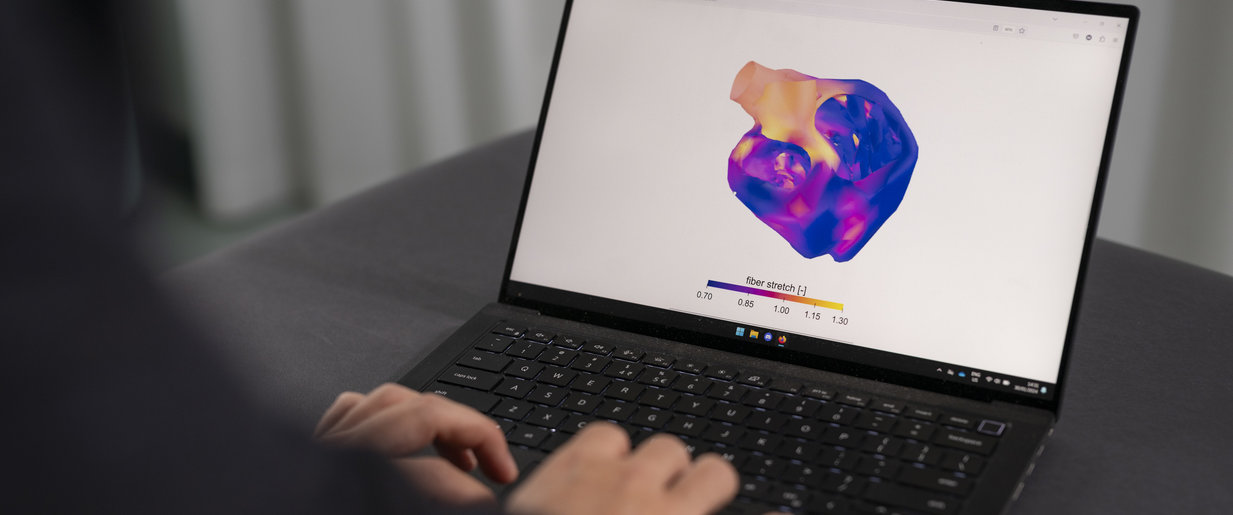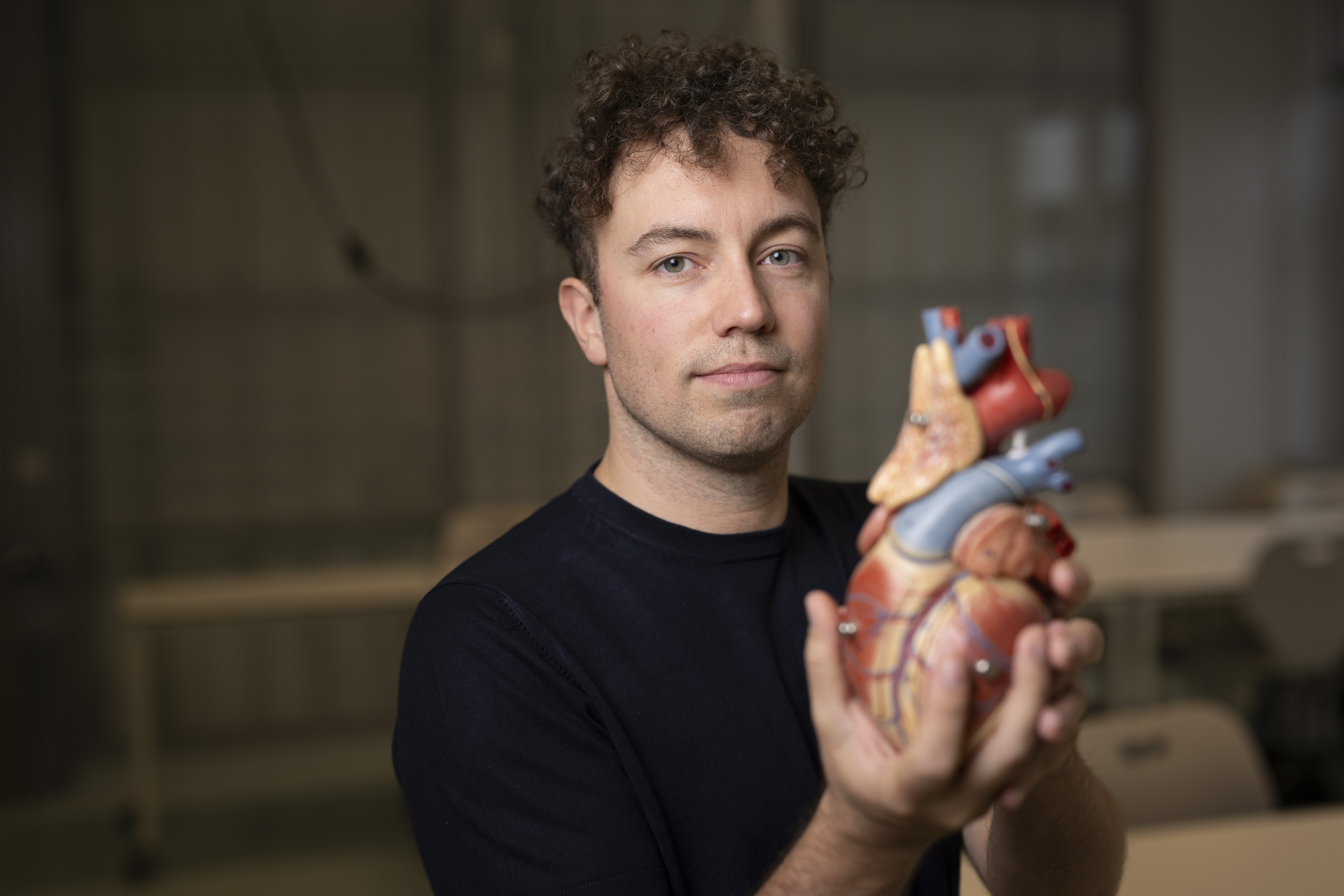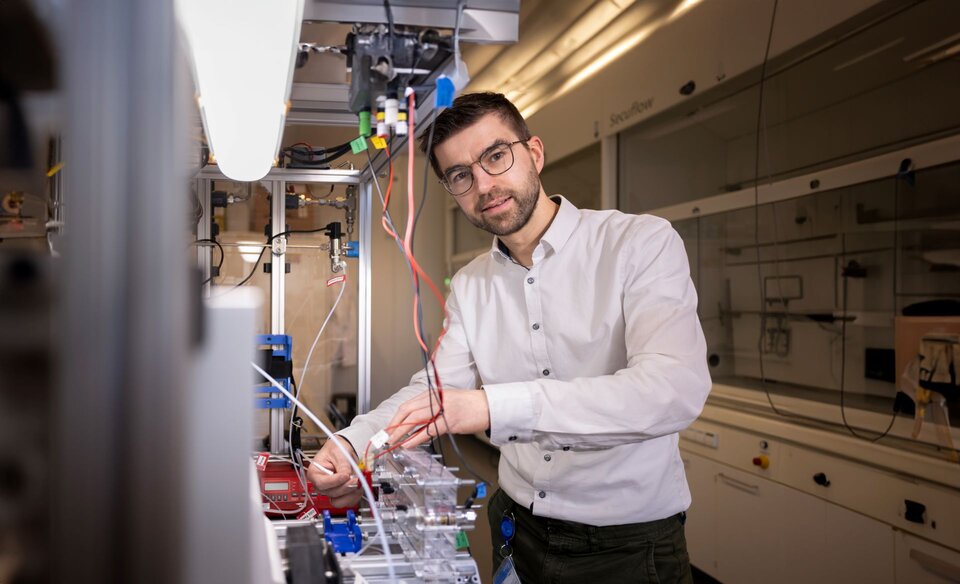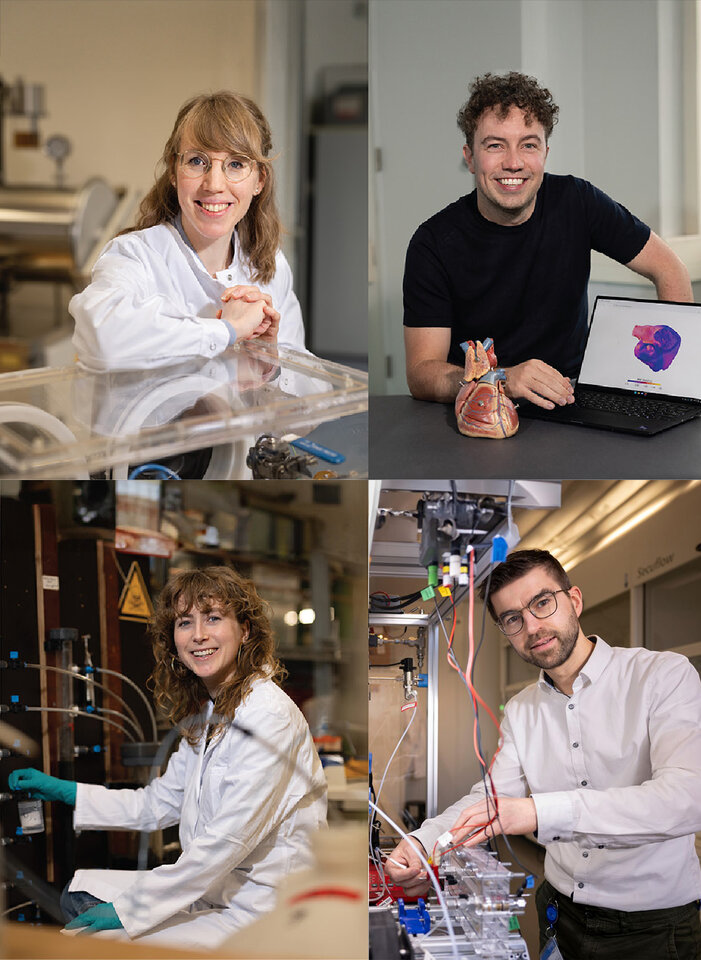Cardiovascular diseases are the leading cause of death globally. Each year 17,9 million people worldwide die of a heart attack or stroke. Heart problems also occur in Dr. Mathias Peirlinck’s family. This is his motivation to work on a digital twin for the heart. It involves innovative computer models to get a better understanding of the heart and make the treatment more patient specific. At the same time, he admires the heart immensely. “The heart is a highly impressive pump that in terms of engineering and technology, is hard to reproduce.”
Peirlinck’s group is analysing the make-up of the human heart, how it functions and responds to changing electrophysiological, mechanical and hydraulic circumstances. They also want to map how the heart differs among patients and how it responds to things like intensive sports, medication, surgery, or implants. Peirlinck explains. “To do this, we build computer programmes that bring together the medical imaging, biomechanical data, the basic principles of physics, and a vast amount of computational power to create a digital twin of the heart. This allows us to see how the heart works virtually.”
Patient-specific treatment
The digital twin could help doctors carry out better analyses and choose the best patient-specific treatment. “The model helps predict how medication could work in the short term or the fit of a new heart valve. I expect that we will soon be able to bring this into practice with doctors, but I would first like the models to better predict the outcomes in the long term. The main question of my research is what will happen to a heart in five years’ time if we implant a new device or administer certain medicines. We do not only want to optimise a procedure in the short term, but also in the long term.

"Heart failure is often chronic that gets worse with long-term stress. We want to break this cycle and adjust the mechanical burden."
Dr.ir. Mathias Peirlinck, Assistant Professor TU Delft
Mechanical burden
Peirlinck’s long-term goal is to understand how heart diseases evolve. “Heart disease is often chronic in nature and a consequence of long-term mechanical overloading of the heart’s muscle tissue. We want to break this cycle and protect the muscle. If I can understand how the heart tissue responds to mechanical overloading, I can design strategies to circumvent the muscle from deteriorating. Doctors are also looking into this but are often constrained by clinical trials that can take five to ten years. Our digital twin could simulate thousands of virtual patient hearts a day. This is why I believe in this technology. But we need relevant data to feed the models.”
Engineer’s heart
“Our work will appeal to a lot of engineers. The mechanical behavior of heart tissue is quite extreme, and totally different from classical engineering materials like steel or concrete. At the same time, these tissues have a lot of biological, structural, and functional variations which confronts us with various mathematical challenges to study it. The heart is a highly impressive pump that, in terms of engineering and technology, is hard to reproduce. People do not always recognize the ingenuity of the human body. The geometrical organization of the muscle fibers in the heart, for example, is amazing. It is a highly efficient architecture to pump blood quickly and with minimal energy around the body. These features are enormously interesting.”
Experiments
To gather additional data as input for the computer models, Peirlinck would like to test samples of heart tissue by exposing them to complex mechanical loading. “We need data from both healthy and sick hearts. As you do not want to mess around with a healthy human heart, we use tissue from pigs’ hearts as these closely resemble human hearts. In time, we would like to carry out the same experiments onredundant human tissue removed during cardiac surgeries. Erasmus MC is helping us here. They have the techniques and the knowledge.”
Donations from alumni
Peirlinck will use the donations from alumni for the materials that are needed for the experiments and to pay the researchers who will carry them out. “These tests form a crucial source of information and will help us improve our understanding on the heart’s long-term function and behavior, both in health and disease.”
-
Delft University Fund uses your data to process and record your donation and to inform you about the activities and work of the University Fund. Your personal details will be treated confidentially in accordance with the Dutch Personal Data Protection Act and will never be provided to third parties. Please read our privacy statement here.
Researcher profile
Name: Mathias Peirlinck (33)
Born in: Belgium
Expertise: biomechanical engineer
Faculty: Mechanical Engineering
Working on: digital twin for the heart
Impact: predict the best treatment for heart problems and better understand the mechanics of heart diseases
Donation spent on: more research into the functioning of heart tissue
Why TU Delft
“The main reason I chose TU Delft is for its strong background in mechanical engineering. It has a lot of expertise in studying complex materials, modelling behaviour, and designing new experimental set-ups and implants. Our close collaboration with Erasmus MC also gives us access to tissues and the knowledge of medical specialists doing clinical trials. There are not that many places in the world where this works as well as it does here at TU Delft, and the convergence between Erasmus MC and TU Delft only further strengthens the bonds.”






